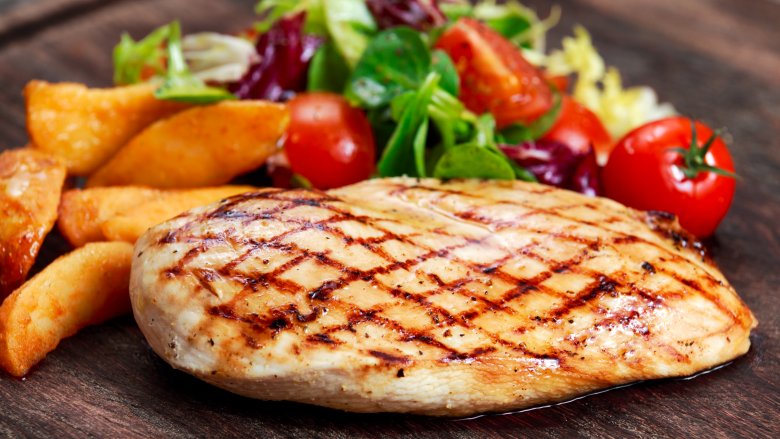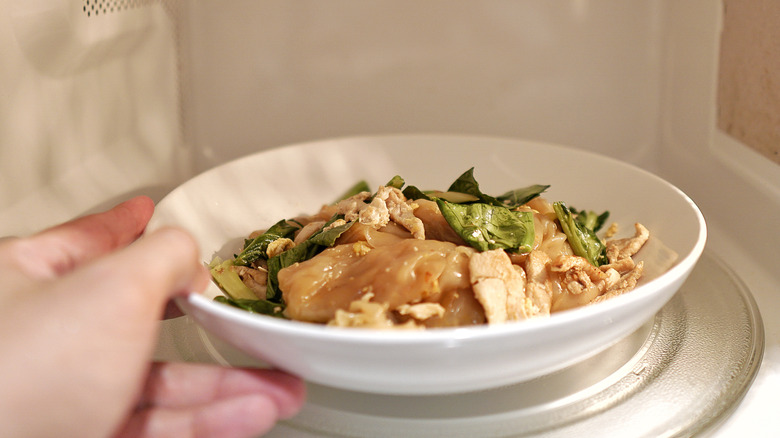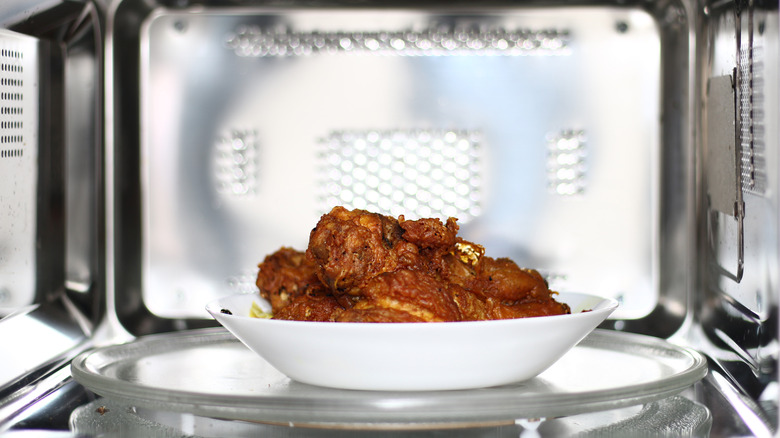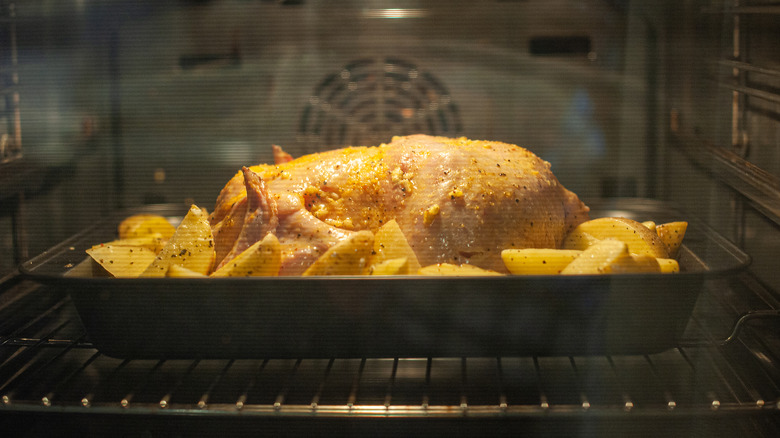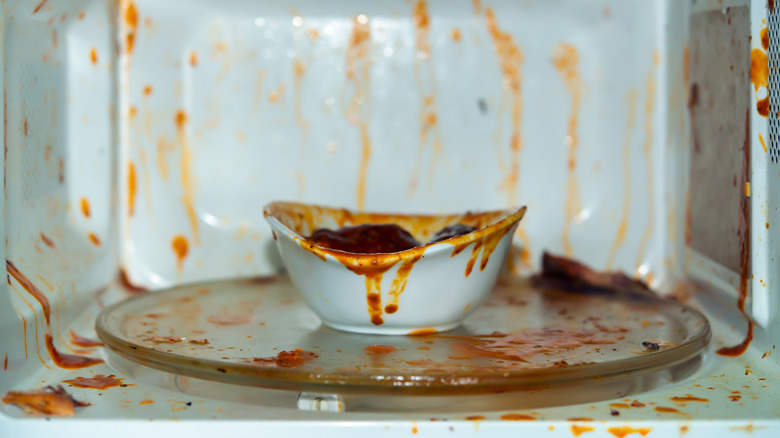You Should Never Reheat Chicken In The Microwave. Here's Why
The microwave oven is a modern technological miracle. We might take microwaves for granted now, but ever since they became affordable for the average household in the 1960s and '70s, their popularity has soared, and they have forever changed how we cook and reheat food. As great as they are for making buttery popcorn late at night, or quickly cooking up a frozen meal, the microwave isn't ideal for everything — even if all you're doing is reheating. One prime example of this is chicken.
Let's get something out of the way right up front: Sometimes ,you just don't have time to turn on the oven to reheat your food. And in the summer, it's just too hot to heat the whole house while making leftovers. That said, when it comes to chicken, it's worth making the time and dealing with the heat, not only for the flavor and texture of your food, but for food safety as well.
The Centers for Disease Control and Prevention (CDC) estimate that there are about 48 million cases of food poisoning in the United States each year, resulting in about 128,000 hospitalizations and more than 3,000 deaths. One of the leading causes of these food poisoning cases is salmonella, which causes 1.2 million cases of annual food poisoning alone. So, what does this have to do with your chicken? You guessed it: Salmonella can be found in raw chicken, as can campylobacter and clostridium perfringens bacteria.
Should you microwave cooked chicken?
You might wonder how using a microwave to reheat chicken is different from using the oven or stovetop. It comes down to two things: Was the chicken stored properly prior to reheating, and are you following the recommended microwave guidelines?
Once chicken is cooked to the recommended internal temperature of 165°F, the bacteria should have been eliminated. But that doesn't mean they're gone for good. After cooking, chicken needs to be refrigerated or frozen within two hours (and if it's hot out, within one hour). Any longer than that, and bacteria start to regrow. When chicken is reheated to that internal temperature of 165°F, bacteria are again eliminated. But microwaves don't do a great job of that compared with ovens and stovetops.
According to the World Health Organization (WHO), microwaves don't penetrate thick pieces of food very well, which can lead to uneven heating. Even if part of your leftover chicken is now piping hot, there may be portions of it that never reached an internal temperature of 165°F — and bacteria that can cause foodborne illnesses may still be hanging out. The WHO recommends allowing food to rest after heating in a microwave to ensure the heat is distributed evenly. The USDA also recommends stirring food — yes, even in microwaves with a turntable — to ensure even cooking. Microwave heat can only penetrate 1 to 1-1/2 inches into food; the larger the piece of chicken, the more you have to rely on conduction heating from the outer surface.
Chicken might not taste great after being microwaved
Let's say you're a microwave aficionado who rotates food, cooks meat on low power for a longer time, and uses a thermometer to ensure a safe temperature. You still shouldn't be reheating chicken in the microwave for the sake of its flavor and texture.
Postdoctoral research scientist Dr. Kyle Frischkorn explained in a 2019 Serious Eats article that reheating leftovers often results in what he calls "Warmed-Over Flavor," or WOF. Frischkorn worked with the team at Serious Eats to see if they could minimize WOF in chicken. While they found that WOF is largely unavoidable, regardless of reheating technique, he didn't mince words when sharing his feelings about microwaving chicken. "From the reheating-methods portion of the testing, the clearest result was that microwaving does gross things to chicken and should be avoided at all costs," he wrote, further noting an "unappealingly spongy texture" combined with the warmed-over flavor.
Let's go out on a limb and say that spongy, funky chicken isn't what you're looking for when you reheat your leftovers. What other options do you have? Conventional cooking wisdom says you should reheat chicken the same way it originally cooked. This means your baked chicken dish should be reheated in the oven, your sautéed chicken should be reheated in a pan, and so forth. Not only will it taste better, but it'll also be safer.
When it comes to chicken, ditch the microwave. Your health and taste buds will thank you.
You can actually hear your chicken getting dryer
If you've ever attempted to reheat a chicken dish in the microwave, you've probably heard a loud pop after just a few seconds. This alarming sound indicates that the chicken is drying out from the radiation. That's right: You can actually hear the chicken dehydrating.
How does this happen, exactly? According to Britannica, solid foods that are high in moisture content, such as potatoes, squash, eggs, and of course, chicken, are not ideal for microwaving. This culinary principle has to do with some basic laws of chemistry. Essentially, when the water molecules within the chicken expand, they turn into gas, forming piping hot steam. However, because the steam isn't able to escape the meat easily, the chicken ends up retaining too much pressure from the microwave radiation, causing it to make a popping noise or even explode.
To help prevent your chicken from overdrying or becoming rubbery in the microwave, PureWow suggests moistening it with a bit of water and olive oil beforehand and covering it with plastic wrap.
There are a lot of other foods you should never microwave
In addition to chicken, there are plenty of other foods that don't reheat well in the microwave. For one, if you want to enjoy tepid hard-boiled eggs, avoid placing them in the microwave whole, as this can result in an explosion, per the Los Angeles Times. If you really want to microwave hard-boiled eggs, it's best to cut them into pieces before warming them, Reddit suggests. Processed meats such as bacon, sausage, and cold cuts are also microwave no-no's due to the chemicals typically used to preserve them.
Furthermore, did you know that microwaving hot peppers can not only irritate your throat and eyes, but also cause them to catch fire, literally? Grapes have also been known to burst into flames in the microwave, per Wired. Want to slurp up a bowl of next-day pasta? Consider reheating the sauce on the stovetop, because microwaving tomato sauces can result in a splattery mess, according to Eating Well.
Although the microwave may come in handy in a pinch, use this appliance with caution to ensure your leftovers are safe. (And if you work in an office, try your best to not reheat fish.)
